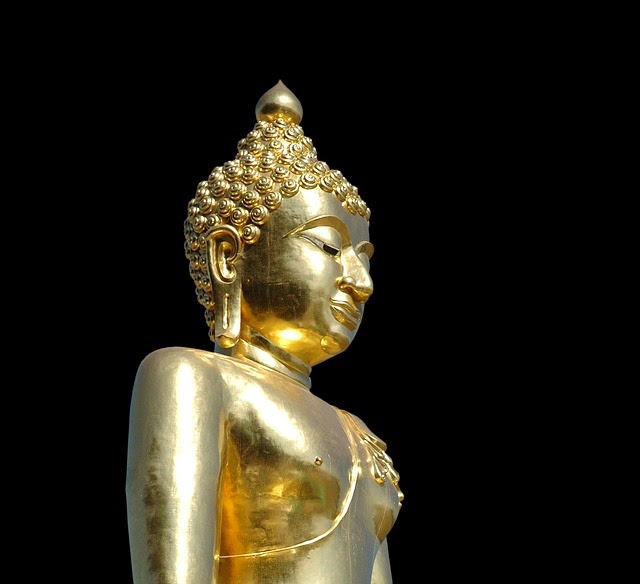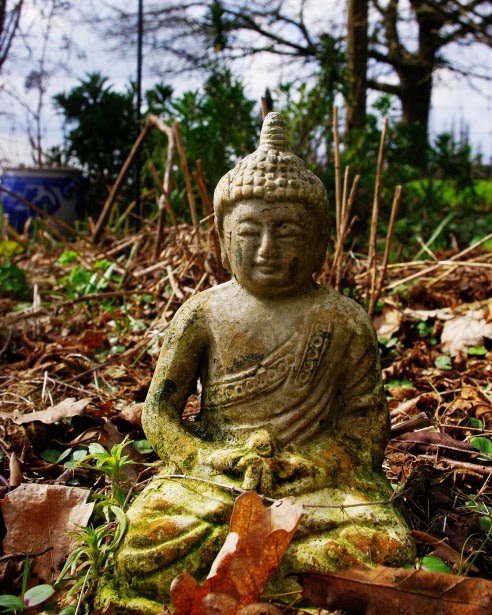CHAPTER TWENTY-SIX.
THE BRAHMANA.
To Find More Interesting Resources Click below :
|
Cut off the stream,[1] O Brāhmana, right manfully;
Repel desires; when thou hast known the end
Of things conditioned, thou shalt be
A knower of the Uncreate.[2]
384.
When by the twofold law (restraint and ecstasy),
By virtue of the knowledge he hath gained,
The Brāhmana hath crossed the stream;
Then every fetter falls away.
385.
Whoso the stream hath crossed and from this shore hath passed,[3]
Free from all cares, unfettered; one to whom
This shore and that alike are naught;
Him I deem a Brāhmaṇa.
386.
Whoso dwells meditiative, passionless,
And free from all Taints, his course hath run,
Whoso hath won the highest Goal—
Him I deem a Brāmaṇa.
387.
"One who is rid of evil" is a Brāmaṇa;
Samaṇa is one who tranquil hath become;
"Gone forth from all impurity";
The hermit is pabbajjā called.[4]
388.
Let not a Brāhmaṇa assail a Brāhmaṇa;
Nor let him with the assailant angry be,
Woe to the striker; greater woe
To him that, stricken, strikes again.
To Find More Interesting Resources Click below :
|
No little profit cometh to the Brāhmaṇa
Who hath his mind from pleasant things restrained;
Soon as the lust to harm is gone
All sorrowing is laid to rest.
391.
Whoso offendeth not in thought and word and deed,
In whom no evil from these three is seen;
Whoso is in these three controlled;
Him I deem a Brāhmaṇa.
392.
If there be one from whom thou canst obtain the Norm
Which He, the All-Awakened One, declared,
Revere him, as a Brāhmaṇa
The sacrificial fire reveres.
393.
Not matted hair, nor caste, nor noble birth can make
The Brāhmaṇa; but he that knows the truth
And knows the Norm, is blest indeed;
And him I deem a Brāhmaṇa.
394.
Of what avail to thee, O fool, is matted hair?
And what avails thy garment made of skins?
The outer part thou makest clean,
But all is ravening within.[5]
395.
Whoso wears rags from dustheaps picked, whoso is lean,
With veins o'erspread, who in the jungle dwells
And meditates in loneliness;[6]
Him I deem a Brāhmaṇa.
396.
One is not Brāhmaṇa because of race or birth;
"Hail-fellow" is such called, and riches hath.[7]
Possessing naught, free from desire
Is one I call a Brāhmaṇa.
397.
Whoso hath cut all fetters off and hath no fear
Of what may him befall; whoso from bonds
And all attachments is released;
Is one I call a Brāhmaṇa.
398.
Whoso hath cut the strap, the leathern thong, the ropes[8]
And all thereto pertaining, and the bar
Hath lifted; him, the Awakened one;
Him I deem a Brāhmaṇa.
399.
He who endures, tho' innocent of all offence,
Abuse and blows and e'en imprisonment
With patience strong, a host in strength;
Him I deem a Brāhmaṇa.
400.
Who hath no anger, who to all his vows is true,
Upright in life, from passion free, subdued,
No more on earth to be reborn;
Him I deem a Brāhmaṇa.
401.
Who like a dew-drop on a lotus-lily leaf,
Or seed of mustard on a needle's point,
Clings not to any worldly bliss;
Him I deem a Brāhmaṇa.
402.
Who knoweth even in this world his sorrow's end,
Who bath laid down the burden of desire,
Emancipated from his bonds;
Him I deem a Brāhmaṇa.
403.
Whoso is deep in wisdom and intelligence,
Who can with skill discern the right and wrong,
Who hath attained the highest goal;
Him I deem a Brāhmaṇa.
404.
Whoso with householders and wanderers alike
Small dealings hath, who lives the homeless life,
A mendicant of scanty needs;
Him I deem a Brāhmaṇa.
405.
Whoso withholds the rod of painful punishment
From living creatures, be they weak or strong,
Who neither strikes nor makes to strike,
Him I deem a Brāhmaṇa.
406.
Whoso forbearance hath to those that hinder him,
And to the angry showeth gentleness,
Among the greedy without greed;
Him I deem a Brāhmaṇa.
407.
From whom all anger, hate, hypocrisy and pride
Have fall'n away, as from a needle's point
A grain of mustard-seed falls off;
Him I deem a Brāhmaṇa.
408.
Gentle in ways and apt to teach his fellow-men,
Whoso will utter truth and naught but truth,
Whoso in speech offendeth not;
Him I deem a Brāhmaṇa.
409.
He that takes nothing in this world that is not given,
Whatever it may be, or great or small,
Or long or short or good or bad;
Him I deem a Brāhmaṇa.
410.
In whom is seen no more the longing of desire
For this world or beyond, who hath no lust,
Who hath no fetters any more;
Him I deem a Brāhmaṇa.
411.
In whom is seen no craving, who, because he knows,
Asks not in doubt the How or Why, for he
Hath reached Nibbāna's peace profound;
Him I deem a Brāhmaṇa.
412.
Whoso on earth hath passed beyond the opposites
Of good and evil, and is free from grief,
From passion and impurity;
Him I deem a Brāhmaṇa.
413.
Who, like the moon on high, is stainless, pure and calm,
Translucent and serene, who hath restrained
The rise of all delightful states;
Him I deem a Brāhmaṇa.
414.
Whoso hath trod the hard and muddy road of births,
Hath crossed delusion, reached the other shore,
Nor lusts, nor doubts, grasps not, is calm,
Him I deem a Brāhmaṇa.
415.
Who homeless wanders through this world, a mendicant,
Abandoning desires, who hath restrained
The rise of sensual delight;
Him I deem a Brāhmaṇa.
416.
Who homeless wanders through this world a mendicant,
Abandoning his lust; who hath restrained
The rise of craving and desire;
Him I deem a Brāhmaṇa.
417.
Whoso hath left behind all ties that bind on earth,
And e'en the heavenly world transcended hath;
Whoso from every tie is free;
Him I deem a Brāhmaṇa.
415.
Who joy and pain hath left, who from the heat of life
Is cooled, and hath no basis of rebirth,
Heroic conqueror of the worlds;
Him I deem a Brāhmaṇa.
419.
Who knows the rise and fall of things in birth and death,
Who is not of the world, who hath the path
Well trod, who hath become awake;
Him I deem a Brāhmaṇa.
420.
Whose passage[9] hence the gods themselves cannot discern,
Nor demi-gods nor men; a worthy one
In whom the passions are subdued;
Him I deem a Brāhmaṇa.
421.
To whom pertaineth naught of past or future things
Or of the present; one who owneth naught,
Who hath no wish for anything;
Him I deem a Brāhmaṇa.
422.
Dauntless,[10] pre-eminent, heroic mighty seer,
The conqueror, desireless one, made clean,[11]
Whose eyes have opened to the light,[12]
Him I deem a Brāhmaṇa.
423.
Who knows his former births, who sees both heaven and hell,[13]
Who now at last hath reached the end of births;
Perfect in knowledge he who hath done all things well,
That sage I call a Brāhmaṇa.
[1] Cf. v. 178.
[2] Akataññu, "unconditioned," Nibbāṇa.
[3] 'lit. one for whom there exists neither this shore (the stream being not yet entered) nor that shore (Arahantship being yet unattained) nor both shores (as he has now attained)'.
[4] Sāhita, "removed," the supposed etymology of Brāhmana; as samitatta, "quieted" is here supposed to be that of samana, ascetic monk. Pabbajjā is one who "goes forth," takes the robes, becomes ordained a Buddhist mendicant monk.
[5] Cf. the words of the Christ to the Pharisees: "Now do ye Pharisees make clean the outside of the cup and the platter, but your inward part is full of ravening and wickedness." The word used, gahanam, 'grasping,' may also mean 'jungle'.
[6] These were the marks of the early and stricter ascetics; even to-day the bhikkhus of Ceylon have their robes made of pieces of cloth sewn together, but these are not picked from the dust-heap.
[7] "Hail-fellow," bhovādi, one who uses the disrespectful term of bho, "I say! man". These Brahmins who did not accept the Buddha as Master would address Him in this way, and of course they were often wealthy men.
[8] The strap is said to be hate; the thong, desire; the ropes, orthodoxy with its attendant narrowness; the bar, ignorance that shuts the door of knowledge.
[9] Cuti; gati; the "fall" from other worlds into this one, and the 'going' or passage or state of the next birth.
[10] Like a bull.
[11] Nahātakam, an allusion to the ceremonial bathing of the Brāhmaṇa after finishing his course of studies.
[12] The meaning of buddha.
[13] One who knows earth, heaven and hell, and can range them at will, is called ñānatilōka, "knower of the three worlds". Such a one is born no more, as he has learned the lessons of these worlds.



















